一般将来时的知识点六年级
一般将来时 知识点
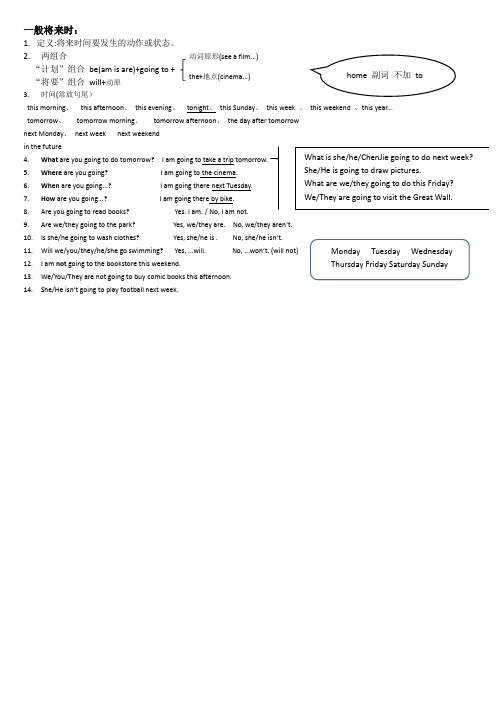
一般将来时:1. 定义:将来时间要发生的动作或状态。
2. 两组合 “计划”组合 be(am is are)+going to + “将要”组合 will+动原3. 时间(常放句尾) this morning 、 this afternoon 、 this evening 、 tonight 、 this Sunday 、 this week 、 this weekend 、this year... tomorrow 、 tomorrow morning 、 tomorrow afternoon 、 the day after tomorrownext Monday 、 next week next weekendin the future4.What are you going to do tomorrow?I am going to take a trip tomorrow. 5.Where are you going?I am going to the cinema. 6.When are you going...? I am going there next Tuesday. 7.How are you going...? I am going there by bike. 8.Are you going to read books? Yes. I am. / No, I am not. 9. Are we/they going to the park? Yes, we/they are. No, we/they aren ’t. 10. Is she/he going to wash clothes? Yes, she/he is . No, she/he isn ’t.11. Will we/you/they/he/she go swimming? Yes, ...will. No, ...won ’t. (will not)12. I am not going to the bookstore this weekend.13. We/You/They are not going to buy comic books this afternoon.14. She/He isn ’t going to play football next week. 动词原形(see a film...)the+地点(cinema...)。
六年级英语-一般将来时(含练习题)
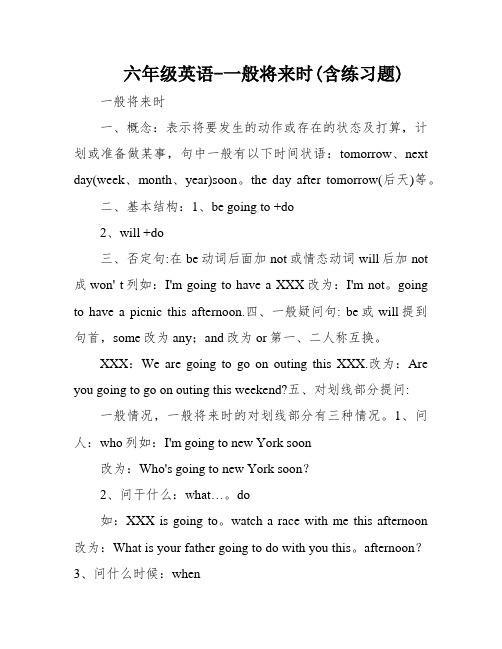
六年级英语-一般将来时(含练习题)一般将来时一、概念:表示将要发生的动作或存在的状态及打算,计划或准备做某事,句中一般有以下时间状语:tomorrow、next day(week、month、year)soon。
the day after tomorrow(后天)等。
二、基本结构:1、be going to +do2、will +do三、否定句:在be动词后面加not或情态动词will后加not 成won' t列如:I'm going to have a XXX改为:I'm not。
going to have a picnic this afternoon.四、一般疑问句: be或will提到句首,some改为any;and改为or第一、二人称互换。
XXX:We are going to go on outing this XXX.改为:Are you going to go on outing this weekend?五、对划线部分提问: 一般情况,一般将来时的对划线部分有三种情况。
1、问人:who列如:I'm going to new York soon改为:Who's going to new York soon?2、问干什么:what…。
do如:XXX is going to。
watch a race with me this afternoon 改为:What is your father going to do with you this。
afternoon?3、问什么时候:when列如:She's going to go to bed at nine 改为:When is going to bed?六、同义句:。
一般将来时语法知识点
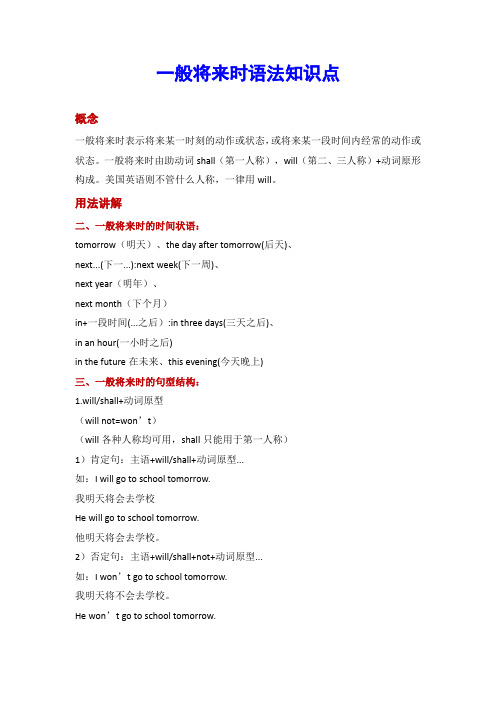
一般将来时语法知识点概念一般将来时表示将来某一时刻的动作或状态,或将来某一段时间内经常的动作或状态。
一般将来时由助动词shall(第一人称),will(第二、三人称)+动词原形构成。
美国英语则不管什么人称,一律用will。
用法讲解二、一般将来时的时间状语:tomorrow(明天)、the day after tomorrow(后天)、next...(下一...):next week(下一周)、next year(明年)、next month(下个月)in+一段时间(...之后):in three days(三天之后)、in an hour(一小时之后)in the future在未来、this evening(今天晚上)三、一般将来时的句型结构:1.will/shall+动词原型(will not=won’t)(will各种人称均可用,shall只能用于第一人称)1)肯定句:主语+will/shall+动词原型...如:I will go to school tomorrow.我明天将会去学校He will go to school tomorrow.他明天将会去学校。
2)否定句:主语+will/shall+not+动词原型...如:I won’t go to school tomorrow.我明天将不会去学校。
He won’t go to school tomorrow.他明天将不会去学校。
3)一般疑问句:Will/Shall+主语+动词原型...如:Will you go to school tomorrow?你明天要去学校吗?Will he go to school tomorrow?他明天要去学校吗?肯定回答:Yes,主语+will.如:Yes,I will.Yes,he will.否定回答:No,主语+will+not.如:No,I won’t.No,he won’t.4)特殊疑问句:特殊疑问词+will/shall+主语+动词原型... 如:What will you do tomorrow?你明天将会做什么?What will he do tomorrow?他明天将会做什么?2.be going to+动词原型1)肯定句:主语+be going to+动词原型...如:I am going to buy some books tomorrow.我明天打算去买一些书。
六年级英语一般将来时讲解加练习
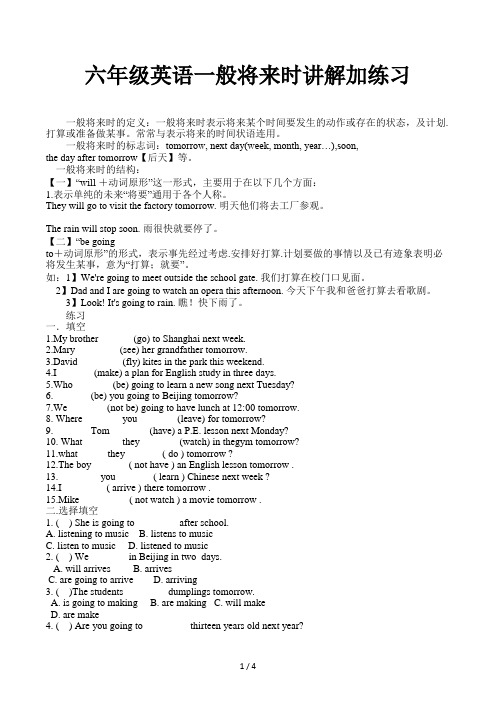
六年级英语一般将来时讲解加练习一般将来时的定义:一般将来时表示将来某个时间要发生的动作或存在的状态,及计划.打算或准备做某事。
常常与表示将来的时间状语连用。
一般将来时的标志词:tomorrow, next day(week, month, year…),soon,the day after tomorrow【后天】等。
一般将来时的结构:【一】“will +动词原形”这一形式,主要用于在以下几个方面:1.表示单纯的未来“将要”通用于各个人称。
They will go to visit the factory tomorrow. 明天他们将去工厂参观。
The rain will stop soon. 雨很快就要停了。
【二】“be goingto+动词原形”的形式,表示事先经过考虑.安排好打算.计划要做的事情以及已有迹象表明必将发生某事,意为“打算;就要”。
如:1】We're going to meet outside the school gate. 我们打算在校门口见面。
2】Dad and I are going to watch an opera this afternoon. 今天下午我和爸爸打算去看歌剧。
3】Look! It's going to rain. 瞧!快下雨了。
练习一.填空1.My brother ______ (go) to Shanghai next week.2.Mary ________ (see) her grandfather tomorrow.3.David ________ (fly) kites in the park this weekend.4.I_______ (make) a plan for English study in three days.5.Who _______ (be) going to learn a new song next Tuesday?6._______ (be) you going to Beijing tomorrow?7.We _______ (not be) going to have lunch at 12:00 tomorrow.8. Where _______ you _______ (leave) for tomorrow?9._______ Tom _______ (have) a P.E. lesson next Monday?10. What _______ they _______ (watch) in thegym tomorrow?11.what _____ they _______( do ) tomorrow ?12.The boy _______( not have ) an English lesson tomorrow .13.________ you _______( learn ) Chinese next week ?14.I ________ ( arrive ) there tomorrow .15.Mike _________ ( not watch ) a movie tomorrow .二.选择填空1. ( ) She is going to ________ after school.A. listening to musicB. listens to musicC. listen to musicD. listened to music2. ( ) We _______ in Beijing in two days.A. will arrivesB. arrivesC. are going to arriveD. arriving3. ( )The students ________ dumplings tomorrow.A. is going to makingB. are makingC. will makeD. are make4. ( ) Are you going to_________ thirteen years old next year?A. will beB. areC. beD. go5. ( ) ___will see a play in 5 days?A. WhenB. WhatC. WhoD. Whose6. ( ) Mary______ English next year.A. will learnB. will to learnC. are going to learn.D. learns7. ( ) He’ll _____ shopping this afternoon.A. goingB. goC. goesD. went8. ( ) Will you ____ at the bus stop at 10:30?A. meetingB. meetsC. meetD. met9. ( ) Lily and I _______ the guitar. next week.A. am going to playB. are going to playC. will playsD. play10. ( ) How ______ Jenny ___ home tomorrow?A. does......goB. is……goingC. will……goD. do……g o11. ( ) Who is going to _________ a song ?A. sings B singing C. to sing D. sing12. ( ) I _________in Beijing in three days.A. are going to arriveB. arriveC. will arriveD. arrives13. ( ) He _______some model planes tomorrow .A. going to makeB. is makingC. will make D makes14. ( ) Are you going to ___________a doctor next year ?A. will beB.. areC. beD. are going to15. ( ) She ________ you make supper this evening .A. helpsB. will helpC. is helpingD. is going help三.把下列句子变成一般疑问句,并给出肯定和否定回答。
一般将来时知识点

一般将来时知识点一般将来时是英语中用来表达将来时间的一种时态。
在本文中,我们将介绍一般将来时的基本用法和相关的注意事项。
1. 用法一般将来时表示将来某个时间会发生的动作或存在的状态。
通常使用以下方式构成一般将来时:- 使用助动词 "will" + 动词原形,例如:I will go to the cinema tomorrow.- 使用 "be going to" + 动词原形,例如:She is going to take a vacation next month.2. 表示计划和打算一般将来时经常用于表达计划和打算。
当我们准备做一些与未来有关的事情时,可以使用一般将来时来表达我们的意图。
例如:- I will visit my grandparents this weekend.- She is going to study abroad next year.3. 表示预测和预见一般将来时还可以用于表示对未来事件的预测和推测。
我们可以根据目前的情况和证据来作出合理的预测。
例如:- It will rain tomorrow. (天气预报)- I think she will become a successful writer in the future. (个人观点)4. 表示意愿和承诺一般将来时还可以用来表示意愿和承诺。
当我们想要表达我们的意愿或者向别人做出承诺时,可以使用一般将来时来表达。
例如:- I will help you with your homework.- They are going to donate money to charity.5. 注意事项在使用一般将来时时,我们需要注意以下几点:- 在第一人称和第二人称中,"will" 和 "be going to" 是可以互换使用的。
例如:I will / am going to buy a new car.- 在第三人称中,"will" 和 "be going to" 有细微的区别。
一般将来时知识点整理

一般将来时知识点整理
嘿,宝子们!今天咱来聊聊一般将来时那些事儿。
一般将来时呀,就是表示将来要发生的动作或存在的状态哦!就好比你说明天我要去逛街,这就是一般将来时啦。
例子:I will go shopping tomorrow.(我明天会去购物。
)
一般将来时有好几种表现形式呢。
首先,常见的就是“will+动词原形”啦,这就像一个坚定的承诺,比如 He will come to see you.(他会来看你的。
)再者呢,还有“be going to+动词原形”,这就好像是有计划、有
打算的未来行动,就像 She is going to study abroad.(她打算出国留学。
)哎呀,这不就像是你满心期待着要做一件很棒的事情嘛!
想象一下,你和朋友约好了下个月一起去旅行,你肯定会说 We are going to travel next month. (我们下个月要去旅行。
)而不是说其他时
态呀,对吧?一般将来时多重要呀!
还有哦,一般将来时还可以和一些表示将来的时间状语搭配使用呢,比如 tomorrow(明天)、next week(下周)、in the future(未来)等等。
你想想看,要是没有这些时间状语来明确时间,那岂不是有点迷糊啦?
宝子们,一般将来时真的超级有用的,一定要好好掌握呀,以后说英语可就靠它啦!别小瞧它哟,学会了它就能更好地表达对未来的憧憬啦!哈哈!。
一般将来时知识点

一般将来时一、知识梳理(一)基本用法1.概念一般将来时表示将来某一时刻的动作或状态,或将来某一段时间内经常的动作或状态。
2.构成基本构成句型例句am/is/are going todo肯定句I am going to go fishing next weekend.否定句I am not going to go fishing next weekend.一般疑问句Are you going to go fishing next weekend?特殊疑问句What are you going to do next weekend?will/shall do肯定句I shall/will visit my grandmother on Sunday.否定句I shall/will not(won’t)visit my grandmotheron Sunday.一般疑问句---Will you visit my grandmother on Sunday?---Yes,I will./No,I won’t.特殊疑问句What will you do on Sunday?3.常用时间状语明天下个XX后明天:tomorrow,后面可以加morning,afternoon,evening下个:next,后面可以加week,month,year等XX后:after和in,后面可以加three weeks/months/years这里要注意一下,after后加时间点才表示将来,如after3o’clock。
加时间段表示过去,如after2hours表示过去。
in后加时间段表将来,如in two years。
(二)考点1.will和shall的区别will可用于所有人称,但shall仅表示单纯将来时,用于第一人称I和we,作为will的一种替代形式。
以You and I为主语时通常避免用shall。
如:He will be back soon.他很快就会回来。
一般将来时知识点总结

一般将来时知识点总结使用“will”构成一般将来时时,需要注意以下几点:1.表示自愿、判断或意愿:I will help you with your homework.(我会帮你做作业。
)She will buy a new car next year.(她明年会买一辆新车。
)I think it will rain tomorrow.(我认为明天会下雨。
)2.表示预测、推测或猜测:I think he will pass the exam.(我认为他会通过考试。
)They will probably arrive late.(他们可能会迟到。
)She won't be happy to hear the news.(她不会高兴听到这个消息。
)3.表示意愿、命令或请求:Will you please close the window?(请你关上窗户好吗?)I will do as you say.(我会按照你说的去做。
)Will you marry me?(你愿意嫁给我吗?)使用“be going to”构成一般将来时时,需要注意以下几点:1.表示计划、安排或意图:I am going to visit my grandmother tomorrow.(明天我打算去看望我的奶奶。
)They are going to have a party next week.(他们下周要举办一个派对。
)She is going to start a new job next month.(她下个月要开始一份新工作。
)2.表示根据现在的迹象、征兆或证据做出的判断:Look at those dark clouds. It is going to rain.(看那些乌云,要下雨了。
)He has a bad cough. He is going to be sick.(他咳嗽得厉害,快生病了。
)She is studying very hard. She is going to pass the exam.(她正在努力学习,一定会通过考试。
一般将来时讲解及练习六年级

一般将来时标志词:tomorrow,thedayaftertomorrow,nextweek,intwoyears,soon,threedayslater等结构一:willwill可用于所有人称,shall只用于第一人称I和we肯定形式:主+willdo一般疑问:will+主+do否定形式:主+won’tdo特殊疑问:what/when/where/which+will+主+doeg:1.we knowtheresultsoon.我们很快就会知道结果了;2.we knowtheresultsoon.我们不会很快就知道结果的;3. we knowtheresultsoon.我们将会很快就知道结果吗4. weknowtheresult.我们将在什么时候知道结果结构二:begoingto肯定形式:主+begoingto+do一般疑问:be+主+goingto+do否定形式:主+benotgoingto+do特殊疑问:what/when等+be+主+goingto+doeg:skyisfullofblackclouds.Itto .快要下雨了;2.ButIthinkit rain.但我觉得它不会下雨;3.it soon很快就会下雨了吗4. you to tomorrow明天你要干什么小小区别:通常情况下will和begoingto能互换will,shall多习惯用于表示是否愿意,第一人称作主语的疑问句一般用shall不用willbegoingto则多用于表示根据迹象判断将要发生某事,或者计划打算要做的事eg:1.youdrivetoschooltomorrowwemeetat8:00tomorrowattheblackcloudsIt rain.readsomebookinthelibrarythisafternoon.用现在进行时bedoing表示将来时:go,come,leave,arrive等表示位置转移的动词eg:1.UncleWang come.王叔叔就要来了;2.They leaveforBeijing.他们即将前往北京;一般将来时练习一.连词成句并按要求改变句式注意动词的正确形式1、children,at,study,home,will,on,computer,inthefuture肯定陈述句:一般疑问句:2、back,they,month,later,a,get,will肯定陈述句:否定句:一般疑问句:3、he,is,going,a,to,patty,evening,this肯定陈述句:否定句:一般疑问句:特殊疑问句问时间:4. China is a modern and strong country.in twenty years5. Do you study hardfrom now on二、用括号中词的适当形式填空1、Thebus come.Pleasewaitforaminute.2、Guangzhou 将会morebueatifulYes,3、Howyou spentyouwinterholiday4、Peoplehavelessworktodointhefuture.5、we goouttomorrowifit rain三、选择正确的答案1. Thereanimportantmeetingnextweek.A.willbeB.willhaveC.willhasD.willgoingtobe2. toEnglandtomorrow.A.flyB.flewC.isflyingD.flies3. Marywillcomebackfiveo’ter4. yougototheparktomorrowA.WillB.ShallC.DoD.Are5. . The day after tomorrow they ________ a volleyball match.A. will watchingB. watchesC. is watchingD. is going to watch6. .There ________ a birthday party this Sunday.A. shall beB. will beC. shall going to beD. will going to be7. They ________ an English evening next Sunday.A. are havingB. are going to haveC. will havingD. is going to have8. ________ you ________ free next Sunday A. Will; areB. Will; be C. Do; be D. Are; be9. He ________ there at ten tomorrow morning. A. willB. Is C. will beD. be10. ________ your brother ________ a magazine from the libraryA. Are; going to borrowB. Is; going to borrowC. Will; borrowsD. Are; going to borrows作业:一、单项选择;1. There __________ a meeting tomorrow afternoon.A. will be going toB. will going to beC. is going to beD. will go to be2. Charlie ________ here next month.A. isn’t workingB. doesn’t workingC. isn’t going to workingD. won’t work3. He ________ very busy this week, he ________ free next week.A. will be; isB. is; isC. will be; will beD. is; will be4. There ________ a dolphin show in the zoo tomorrow evening.A. wasB. is going to haveC. will haveD. is going to be5.–________ you ________ free tomorrow – No. I ________ free the day after tomorrow.A. Are; going to; willB. Are; going to be; willC. Are; going to; will beD. Are; going to be; will be6. Mother ________ me a nice present on my next birthday.A. will givesB. will giveC. givesD. give7. – Shall I buy a cup of tea for you–________. 不,不要;A. No, you won’t.B. No, you aren’. No, please don’t.D. No, please.8. – Where is the morning paper – I ________ if for you at once.A. getB. am gettingC. to getD. will get二、动词填空;1. I ______leavein a minute. I ______finishall my work before I ______ leave.2. —How long _____ you _____studyin our country—I _____planto be here for about one more year.—What ______ you ______doafter you ______leavehere—I ______returnhome and ______geta job.3. I ______betired. I ______goto bed early tonight.4. Mary’s birthday is next Monday, her mother _____giveher a present.三、句型转换;1. People in the north often go skating in winter. next winter2. There are two cinemas in that town. next year3. He comes back late.in two days4.She is a conductor of a train.soon。
一般将来时的知识点归纳
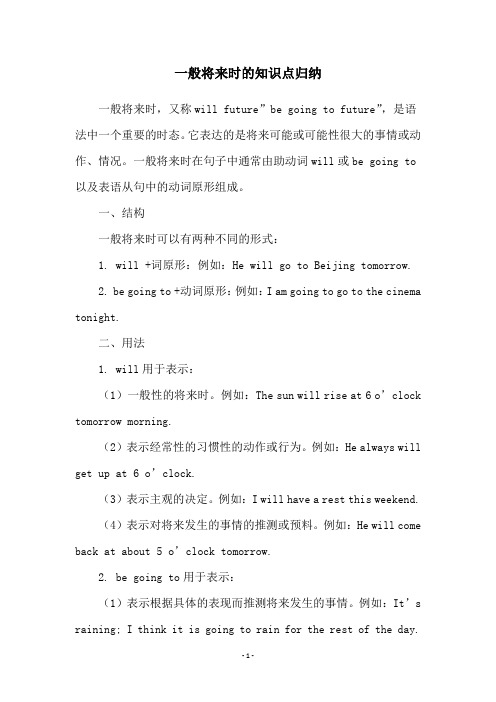
一般将来时的知识点归纳一般将来时,又称will future”be going to future”,是语法中一个重要的时态。
它表达的是将来可能或可能性很大的事情或动作、情况。
一般将来时在句子中通常由助动词will或be going to 以及表语从句中的动词原形组成。
一、结构一般将来时可以有两种不同的形式:1. will +词原形:例如:He will go to Beijing tomorrow.2. be going to +动词原形:例如:I am going to go to the cinema tonight.二、用法1. will用于表示:(1)一般性的将来时。
例如:The sun will rise at 6 o’clock tomorrow morning.(2)表示经常性的习惯性的动作或行为。
例如:He always will get up at 6 o’clock.(3)表示主观的决定。
例如:I will have a rest this weekend.(4)表示对将来发生的事情的推测或预料。
例如:He will come back at about 5 o’clock tomorrow.2. be going to用于表示:(1)表示根据具体的表现而推测将来发生的事情。
例如:It’s raining; I think it is going to rain for the rest of the day.(2)表示计划、安排在将来要做的事情。
例如:I am going to visit my grandparents next month.三、与其它将来时的比较1. 一般将来时意义最为模糊,它可以表示根据一般经验的推测或预料,也可以表示计划、安排在将来要做的事情,也可以表示本能反应。
2. 与将来完成时相比,一般将来时表达的动作或情况没有begore么强调时间先后顺序。
六年级-小学英语-一般将来时

2. Where(询问地点) 例: Where are you going this evening? 今天晚上你打算去哪里? I am going to the bookstore. 我打算去书店。
3. when(询问时间) 例: When are you going to buy the book? 你打算什么时候去买书? I am going at 5 o'clock. 我打算5点钟去。
is
is
+动词原形
“be going to + 动词原形”表将来 构成一般将来时态,表示计划要做的事或根据目 前推测将要发生的动作,意为“打算,将要”
I am going to buy a book. He is going to read a book. She is going to take a look. We are going to take a trip. They are going to play football.
I ______ going to …. You ________ going to …
are
am
He _______ going to …
She ______going to …
is Jack _______ going to … are My parents ______ going to … are Jack and Tom ________going to …
3.一般疑问句:Be+主语+going to+动词原形+将
来时间?
例:Are they going to read a book tonight ?
句型转换。 1.Mike is going to play football
一般将来时的知识点归纳整理
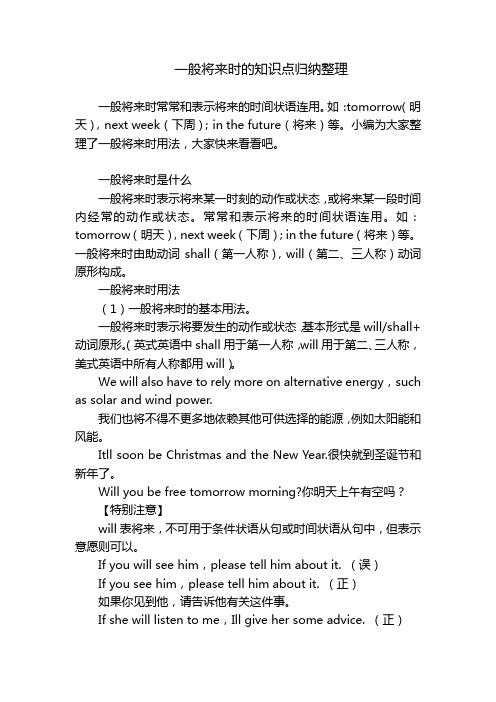
一般将来时的知识点归纳整理一般将来时常常和表示将来的时间状语连用。
如:tomorrow(明天),next week(下周);in the future(将来)等。
小编为大家整理了一般将来时用法,大家快来看看吧。
一般将来时是什么一般将来时表示将来某一时刻的动作或状态,或将来某一段时间内经常的动作或状态。
常常和表示将来的时间状语连用。
如:tomorrow(明天),next week(下周);in the future(将来)等。
一般将来时由助动词shall(第一人称),will(第二、三人称)动词原形构成。
一般将来时用法(1)一般将来时的基本用法。
一般将来时表示将要发生的动作或状态,基本形式是will/shall+动词原形。
(英式英语中shall用于第一人称,will用于第二、三人称,美式英语中所有人称都用will)。
We will also have to rely more on alternative energy,such as solar and wind power.我们也将不得不更多地依赖其他可供选择的能源,例如太阳能和风能。
Itll soon be Christmas and the New Year.很快就到圣诞节和新年了。
Will you be free tomorrow morning?你明天上午有空吗?【特别注意】will表将来,不可用于条件状语从句或时间状语从句中,但表示意愿则可以。
If you will see him,please tell him about it. (误)If you see him,please tell him about it. (正)如果你见到他,请告诉他有关这件事。
If she will listen to me,Ill give her some advice. (正)如果她愿意听我说,我会给她一些劝告。
【考试必备】常与一般将来时连用的时间状语有:next time下次tomorrow明天tomorrow evening明晚before long不久后in the future将来later(on)以后the day after tomorrow后天this afternoon今天下午next year明年(2)一般将来时的其他表达法。
一般将来时与过去将来时知识点总结

语法讲解:★一般将来时【一般将来时定义】:一般将来时表示与现在相比,将来某个时间要发生的动作或存在的状态。
____________________________________ 【一般将来时常见时间状语】:tomorrow明天,the day after tomorrow 后天,soon很快,before long 不久之后,in three days (weeks…)三天(周 ...... )后,next week (month, year)下周(下个月、明年), some day将来的某一天等等。
【一般将来时肯定句构成方式:①主语+ will / shall + 动词(原形)+… 例句:I will buy some bookstomorrow.② 主语+ be going to + 动词(原形)+ … 例句: I am going to buy some books tomorrow.一般将来时否定句构成方式:①主语+ will / shall +not + 动词(原形)+…例句:I will not buy some books tomorrow.② 主语+ be +not+going to + 动词(原形)+… 例句:I am n ot going to buy some bookstomorrow.一般将来时疑问句构成方式:①Will / Shall +主语+动词原形+…例句:Will you buy some books tomorrow② Be + 主语+go ing to + 动词原形+ … 例句: Are you going to buy some books tomorrow _______回答方式:—Yes,主语(代词)+will 一②Yes,主语(代词)+ be否定回答:① No,主语(代词)+will +not ② No, 主语(代词)+be + not注意:在回答"Shall I…”的问句时,一般不用shall直接作答,而用"Yes, please. / No, please don' t. ” 【一般将来时的基本用法】★过去将来时【过去将来时定义】:表示在过去某个时间看来将要发生的动作或存在的状态。
新标准英语六年级下册时态专题复习—一般将来时

新标准英语六年级下册时态专题复习—一般将来时(有be,也有实义动词)一、基本含义:表示将要发生的动作或存在的状态。
句中一般有以下时间状语:tonight,in the future,tomorrow, next day(week, month, year…),soon, the day after tomorrow(后天),in+段时间(在...之后)等。
二、基本结构:①主语+be going to + do;②主语+will+ do.③主语(只能为I /We)+shall+do三、各种句型否定句:在①be动词(am, is, are)后加not;②will后加not成won’t;例如:I’m going to have a picnic this afternoon.→ I’m not going to have a picnic this afternoon.I will have a picnic this afternoon.→ I won’t have a picnic this afternoon.一般疑问句:be或will或shall提到句首,some改为any, and改为or,第一二人称互换。
例如:We are going to go for a walk this weekend.→ Are you going to go for a walk this weekend?We will go for a walk this weekend.→ Will you go for a walk this weekend?特殊疑问句(对划线部分提问):一般情况,一般将来时的对划线部分提问有三种情况。
1. 问人等提问主语。
Who 例如:I’m going to go to New York soon. →Who’s going to go to New York soon.I will go to New York soon. →Who will go to New York soon.2. 问干什么。
一般将来时的知识点归纳六年级

一般将来时的知识点归纳六年级学问是静态的,人有了学问,还应当明白如何正确地将所把握的学问在实践中加以应用,没有才智,充其量不过是一本记载着学问的书。
下面我给大家共享一些一般将来时的学问点归纳六年级,盼望能够关心大家,欢迎阅读!一般将来时的学问六年级1.shall用于第一人称,常被will 所代替。
will 在陈述句中用于各人称,在征求意见时常用于其次人称。
Which paragraph shall I read first? 我先读哪一段呢?Will you be at home at seven this evening? 今晚七点回家好吗?2. be going to +不定式,表示将来。
a. 主语的意图,即将做某事。
What are you going to do tomorrow? 明天准备作什么呢?b. 方案或支配要发生的事。
The play is going to be produced next month。
这出戏下月开播。
c. 有迹象要发生的事。
Look at the dark clouds, there is going to be a storm. 看那乌云,快要下雨了。
3.be +不定式表将来,按方案或正式支配将发生的事。
We are to discuss the report next Saturday. 我们下星期六争论这份(报告)。
4.be about to +不定式,意为立刻做某事。
He is about to leave for Beijing. 他立刻要去北京。
留意:be about to do 不能与tomorrow, next week 等表示明确将来时的时间状语连用。
5.一般现在时表将来。
a. 下列动词come,go,arrive,leave,start,begin,return的一般现在时可以表示将来,主要用来表示在时间上已确定或支配好的事情。
The train leaves at six tomorrow morning. 火车明天上午六点开。
- 1、下载文档前请自行甄别文档内容的完整性,平台不提供额外的编辑、内容补充、找答案等附加服务。
- 2、"仅部分预览"的文档,不可在线预览部分如存在完整性等问题,可反馈申请退款(可完整预览的文档不适用该条件!)。
- 3、如文档侵犯您的权益,请联系客服反馈,我们会尽快为您处理(人工客服工作时间:9:00-18:30)。
一般将来时的知识点六年级
知识是静态的,人有了知识,还应该明白如何正确地将所掌握的知识在实践中加以应用,没有智慧,充其量不过是一本记载着知识的书。
下面小编给大家分享一些一般将来时的知识点归纳六年级,希望能够帮助大家,欢迎阅读!
一般将来时的知识六年级
1.shall用于第一人称,常被will 所代替。
will 在陈述句中用于各人称,在征求意见时常用于第二人称。
Which paragraph shall I read first? 我先读哪一段呢?
Will you be at home at seven this evening? 今晚七点回家好吗?
2. be going to +不定式,表示将来。
a. 主语的意图,即将做某事。
What are you going to do tomorrow? 明天打算作什么呢?
b. 计划或安排要发生的事。
The play is going to be produced next month。
这出戏下月开播。
c. 有迹象要发生的事。
Look at the dark clouds, there is going to be a storm. 看那乌云,快要下雨了。
3.be +不定式表将来,按计划或正式安排将发生的事。
We are to discuss the report next Saturday. 我们下星期六讨论这份报告。
4.be about to +不定式,意为马上做某事。
He is about to leave for Beijing. 他马上要去北京。
注意:be about to do 不能与tomorrow, next week 等表示明确将来时的时间状语连用。
5.一般现在时表将来。
a. 下列动词come,go,arrive,leave,start,begin,return 的一般现在时可以表示将来,主要用来表示在时间上已确定或安排好
的事情。
The train leaves at six tomorrow morning. 火车明天上午六点开。
—When does the bus star? 汽车什么时候开?
—It stars in ten minutes. 十分钟后。
b. 以here,there等开始的倒装句,表示动作正在进行。
Here comes the bus. = The bus is coming. 车来了。
There goes the bell. = The bell is ringing. 铃响了。
c. 在时间或条件句中。
When Bill comes不是will come., ask him to wait for me. 比尔来后,让他等我。
I’ll write to you as soon as I arrive there. 我到了那里,就写信给你。
d. 在动词hope,take care that,make sure that等的宾语从句中。
I hope they have a nice time next week. 我希望他们下星期玩得开心。
Make sure that the windows are closed before you leave the room. 离开房间前,务必把窗户关了。
6.用现在进行时表示将来。
下列动词come, go, arrive, leave, start, begin, return等现在进行时可以表示将来。
I’m leaving tomorrow. 明天我要走了。
Are you staying here till next week? 你会在这儿待到下周吗?
过去将来时的知识六年级
1. 过去将来时的定义
过去将来时主要用于表示过去某个时候看来即将发生的动作或存在的状态。
He said he would come here next Friday. 他说他下周五来这儿。
I knew that he would help us when we were in trouble. 我知
道当我们陷入困境时他会帮助我们。
2. 过去将来时的结构
(1) would + 动词原形
She told us that she would try her best to catch up with other classmates this term. 她告诉我们说她将一切努力在本学期赶上其他同学。
When you asked Li Lei for help, he would never refuse you. 当你请李雷帮忙时,他绝不会拒绝。
(2)was / were going to + 动词原形
He told us that he was going to attend the meeting. 他告诉我说他要参加那次会议。
He said that I was going to be sent to meet her at the railway station. 他说将要派我去火车站接她。
(3)was / were to + 动词原形。
The building was to be completed next month. 这座建筑该在下个月竣工。
Li Lei was to arrive soon. 李雷很快就要到了。
(4)was / were about to + 动词原形。
We were about to leave there when it began to rain heavily and suddenly. 就在我们要离开时,天突然下起了大雨。
He was about to have lunch when the bell rang. 就在他要吃中饭的时候,门铃响了。
(5)was / were +现在分词。
He was leaving the next day. 他第二天要走了。
We were informed that the leaders were coming to our school soon. 我们接到通知说领导们很快要来我们学校。
3. 过去将来时的用法
(1)过去将来时,一般用于主句为过去时的宾语从句中。
He said he would stay with us. 他说他要与我们待在一起。
He said he would never go there again. 他说他绝不会再去那
儿。
(2)过去将来时,用于虚拟语气中。
If I were you, I would not do that. 如果我是你的话,我就不会那样做。
If he were here, he would show us how to do it. 如果他在这儿,他就会向我们展示该如何做了。
【归纳拓展】
was / were going to + 动词原形,was / were to + 动词原形,was / were about to + 动词原形等结构都可表达当时一种未曾实现的意图或打算。
The conference was going to be held the next month. 会议下个月开。
We were to have our class at eight. 八点我们该上课了。
小学生最有效学好英语的方法技巧
1.不能盲目背单词
在单词的记忆中,切记要把读音、拼写和语法融为一体,同步进行。
在这个过程中,会学到发音规则和句型结构。
把单词一个个字母背熟,即不一定能正确拼写单词,又不一定能正确拼写句子。
所以学习背诵单词的前提,同样要与发音规则和语法手脚并用。
2.不能盲目学语法
一些学生把语法看得过于重要,在日常的学习中,就会大量背语法,而在平日的语言交流时,总是死抠语法规则。
考试时,常常纠结于每个句子的结构,这样最终导致口语不流利,考试分数不理想。
其实这样做与语言发展趋势或现行的考试大纲背道而驰,同时也忽视了语言的实践性和综合性。
所以,学习英语必然要把单词和语法相结合,再加上适量的运用。
3.适度规划,坚持到底
其实学英语,就是学说话。
语言的学习,应当勤奋和持续坚持。
大多数人学不好英语的根本原因是懒惰和三天打鱼两天晒网。
所以一份量身定制的学习规划,就显得尤为重要。
